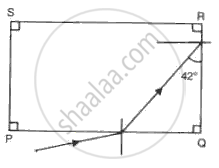Advertisements
Advertisements
प्रश्न
Images formed by totally reflecting prisms are brighter than the image formed by ordinary reflected light, why?
उत्तर
This is because in total internal reflection 100% of incident light gets reflected. On the other hand, in ordinary reflection, 20% to 30% of incident light is lost. So, images formed in the first case are brighter than the images formed in the second case.
APPEARS IN
संबंधित प्रश्न
Draw the diagram of a right-angled isosceles prism which is used to make an invented image erect
What is total internal reflection?
(a) A ray of monochromatic light enters glass PQRS as shown in the fig. Complete the path of ray till it emerges from the glass. (Critical angle of glass is 420).

(b) Draw diagram of a prism periscope.
(c) What are the advantages of total internal reflecting prism over plane mirror?
A ray of light incident at an angle of incidence ‘i’ passes through an equilateral glass prism such that the refracted ray inside the prism is parallel to its base and emerges from the prism at an angle of emergence ‘e’.
How is the angle of emergence ‘e’ related to the angle of incidence ‘i’?
What is meant by the statement, ‘the critical angle for diamond is 24°’?
A ray of light is incident as a normal ray on the surface of separation of two different mediums. What is the value of the angle of incidence in this case?
Answer the following question.
Under what conditions are total internal reflection possible? Explain it with a suitable example.
A given ray of light suffers minimum deviation in an equilateral prism P. Additional prism Q and R of identical shape and of the same material as P are now added as shown in the figure. The ray will now suffer ______.

